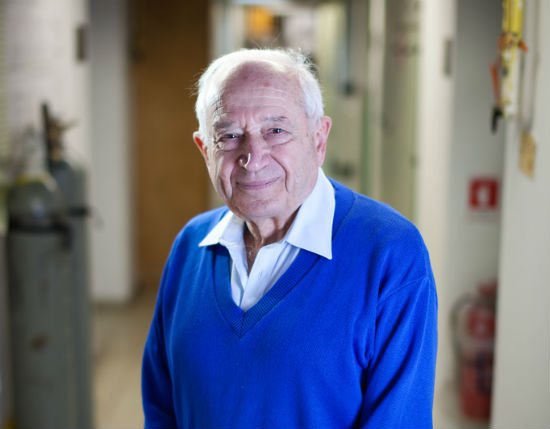You are here
Home 🌿 Medical Cannabis News 🌿 The Grandfather of Marijuana Research Has Never Smoked a Joint 🌿The Grandfather of Marijuana Research Has Never Smoked a Joint

The man considered the world’s foremost marijuana researcher began studying cannabis scientifically in the 1960s. He was not a hippie.
Dr. Raphael Mechoulam, 86, is now a professor at Hebrew University in Jerusalem and an advisor to the Israeli government’s medical marijuana program. He has never smoked a joint. But he’s been deeply curious about cannabis for nearly his whole professional life—starting as a young researcher in Israel, when almost nothing was known about the plant and its medicinal potential.
“I’m a chemist,” Mechoulam recently told Culture magazine. “I work with natural products, and I was looking for something important in natural products in plants, and I was surprised to find that while morphine had been isolated from opium nearly 150 years previously and so was cocaine from coca leaves, the chemistry of cannabis was not well known, and I thought it was a good topic to do research on.”
Getting started was difficult, however. His first experiment was conducted with hashish—a cannabis plant extract—obtained from a police evidence locker through a contact. This approach to obtaining weed turned out to be illegal. “But [Israel] is a small country,” Mechoulam explained. “I went to the Ministry of Health and I apologized, and any time I needed more hashish I went [back] and had no problems.”
The chemist is credited with making many of the most important scientific discoveries about marijuana. First, he isolated the plant’s psychoactive component, tetrahydrocannabinol (THC), and an element of cannabis that produces no high, cannabidiol (CBD), which has many medicinal properties. It’s an antioxidant and anti-psychotic; suppresses seizures; relieves pain; and reduces nausea and inflammation, among other benefits.
Mechoulam also identified cannabis receptors in the human body and studied the way plant cannabinoids interact with those receptors. “The receptors don’t exist because there’s a plant out there,” he said. “The receptors exist because we produce compounds which bind to these receptors, activate them, and cause activities.”
Today, Mechoulam is most curious about those endogenous cannabinoids, the compounds that human and other animal bodies create naturally. These compounds operate in the brain and nervous system, influencing pain, appetite, mood, memory, motivation, and more. He explained to Culture:
There has been a huge amount of work on these endogenous cannabinoids that we make. These compounds seem to be very important in our biology. One of these compounds has to do with bones and…another has to do with blood vessels during head trauma. A third has to with addiction and so on and so forth. There is a lot of interest, and I believe this is the [next] phase of cannabis research.
420 Intel is Your Source for Marijuana News
420 Intel Canada is your leading news source for the Canadian cannabis industry. Get the latest updates on Canadian cannabis stocks and developments on how Canada continues to be a major player in the worldwide recreational and medical cannabis industry.
420 Intel Canada is the Canadian Industry news outlet that will keep you updated on how these Canadian developments in recreational and medical marijuana will impact the country and the world. Our commitment is to bring you the most important cannabis news stories from across Canada every day of the week.
Marijuana industry news is a constant endeavor with new developments each day. For marijuana news across the True North, 420 Intel Canada promises to bring you quality, Canadian, cannabis industry news.
You can get 420 Intel news delivered directly to your inbox by signing up for our daily marijuana news, ensuring you’re always kept up to date on the ever-changing cannabis industry. To stay even better informed about marijuana legalization news follow us on Twitter, Facebook and LinkedIn.




